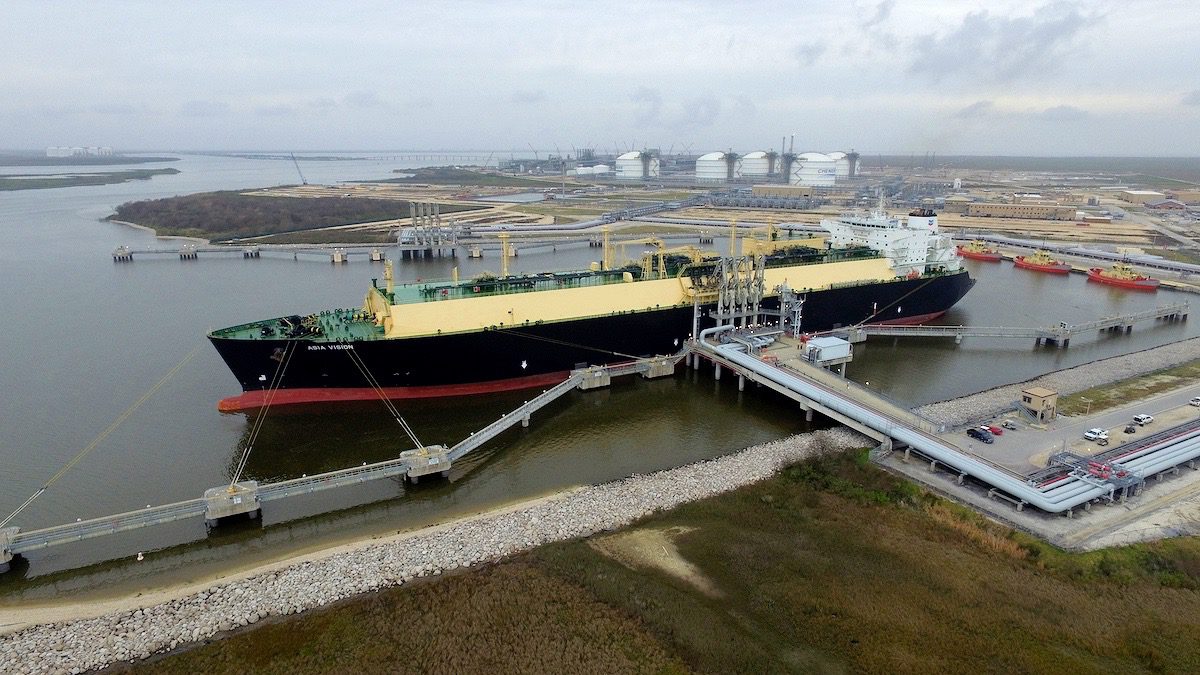Loading of the first commissioning cargo at Cheniere’s Sabine Pass LNG Terminal in Texas in February 2016. File photo: Cheniere Energy
By Kelly Gilblom and Naureen S. Malik (Bloomberg) — The billionaire evangelist of U.S. natural gas exports is finding himself having some surprising conversations these days.
Charif Souki, who co-founded the only company shipping America’s shale gas bounty to foreign buyers, said when he flies to Asia or South America to sign deals for his new firm, no one’s interested. Instead, they come back with a counter-proposal. They’d like to be his partner.
“Nobody is keen to sign contracts,” he said in an interview in Oxford, England. “Even the people who kind of think they should are afraid to do it.”
The reaction is partly due to a worldwide glut of liquefied natural gas, but it’s also a boomerang effect of Souki’s own actions.
The company he started and once oversaw, Cheniere Energy Inc., changed the way LNG was traded globally. Instead of the normal bilateral deals that spanned decades and included a fixed destination, the first wave of U.S. LNG terminal developers created flexible contracts. Their buyers pay a tolling fee to reserve capacity at the terminals, and then pay for the fuel if they opt to take cargoes.
Thanks to the U.S., 42 percent of contracts signed in 2016 included flexible destination clauses, compared with 39 percent before 2014, according to data from the International Energy Agency. The average duration fell 44 percent to nine years over that period.
Now, after being ousted at Cheniere, Souki’s founded another LNG terminal developer, Tellurian Inc., and is discovering buyers are so emboldened they want to rewrite how deals are done. Executives with other U.S.-based developers, including NextDecade Corp., Jordan Cove LNG and Liquefied Natural Gas Ltd., have all recounted similar discussions involving companies considering equity instead of a normal supply deal.
Equity Commitment
“Tellurian definitely wants to find equity investors and if you look at the greenfield projects in the U.S., which are facing pretty high hurdles, they are talking about equity as a way to commit,” said Jason Feer, head of business intelligence at ship broker Poten & Partners Inc. in Houston.
Even companies in Russia are feeling the shift. Leonid Mikhelson, the billionaire chief executive officer of Novatek PSJC, said in a briefing with reporters that the company was open to different types of financing arrangements and shorter-term, more flexible supply deals as it moved forward with its Arctic LNG 2 project scheduled to start by 2023.
“Today, it’s the buyers’ market,” he said. “Novatek is working on new solutions to be in line with new trends.”
The unusual response to Souki’s sales pitch may also be a result of his reputation. His push to capitalize on the shale gas boom by turning a Louisiana import terminal into an export facility eventually made him a billionaire. Prospective investors may also be tempted by the notion of being partially paid back in gas, eliminating their exposure to price volatility, Souki said.
“We’ve been approached by at least a dozen and a half people, companies, that say: ‘We’d like to participate with you,”’ said Souki. “‘You know how to build facilities cheaply and we’ll trust you to go and find the resource.”’
Company presentations have previously estimated the cost of equity will be $1,500 per metric tonne, while the gas can be delivered for $2.25 per million British thermal units. Earlier this year, Tellurian bought a portfolio of shale gas wells in Louisiana and it’s now considering branching out into pipelines, according to CEO Meg Gentle.
The company is now figuring out how to structure the equity deals and expects to make offers as soon as next year. It recently chartered a tanker and is working on deals to ship cargoes with traders based out of London and Singapore, cities that are in time zones more conducive to global LNG trading than Houston’s.
© 2017 Bloomberg L.P

 Join The Club
Join The Club











